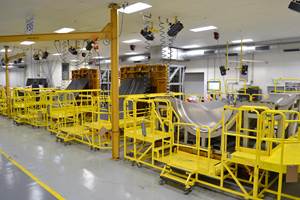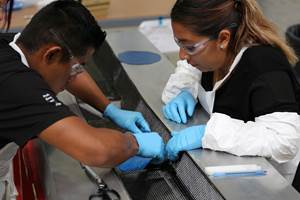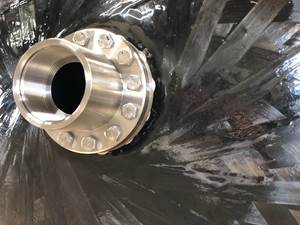Airbus begins Skyway drone shore-to-ship trials
The trials mark the first time unmanned air vehicle (UAV) technology has been deployed in real port conditions to deliver parcels to working vessels at anchorage.
Airbus (Toulouse, France) has begun shore-to-ship trials in Singapore with its Skyways parcel delivery drone. Skyways is an experimental project aimed at establishing multi-modal transportation networks in smart cities. The trials mark the first time drone technology has been deployed in real port conditions to deliver a variety of small, time-critical maritime essentials to working vessels at anchorage.
The maiden shore-to-ship delivery flight was made to the Swire Pacific Offshore’s Anchor Handling Tug Supply vessel M/V Pacific Centurion, 1.5 km from the shoreline of Singapore’s Marina South Pier, carrying 1.5 kg of 3D printed consumables. Landing safely on the ship deck and depositing its cargo to the shipmaster, the Skyways unmanned air vehicle (UAV) swiftly returned to its base, with the entire flight taking within 10 minutes.
The trials are being undertaken in conjunction with maritime logistics and port services company Wilhelmsen Ships Services (Lysaker, Norway). During the trials, the Skyways drone will lift off from the pier with a payload capability of up to 4 kg, and navigate autonomously along pre-determined aerial corridors to vessels as far as 3 km from the coast.
“Today’s accomplishment is a culmination of months of intense preparation by our dedicated team, and the strong collaboration with our partner, as we pursue a new terrain in the maritime industry,” says Airbus’ Skyways lead, Leo Jeoh. “We are also happy to be taking a step forward for Airbus’ urban air mobility endeavor, as we continue to explore and seek better understanding of what it takes to fly safe and reliable autonomous flying vehicles safely.”
Marius Johansen, vice president Commercial, Ships Agency at Wilhelmsen Ships Services says, “Delivery of essential spares, medical supplies and cash to master via launch boat, is an established part of our portfolio of husbandry services, which we provide day in and day out, in ports all over the world. Modern technology such as the unmanned aircraft systems, are just a new tool, albeit a very cool one, with which we can push our industry ever forward and improve how we serve our customers.”
The use of unmanned aircraft systems in the maritime industry paves the way for possible enlargement of existing ship agency services’ portfolio, speeding up deliveries by up to six times, lowering delivery costs by up to 90%, reducing carbon footprint, and mitigating risks of accidents associated with launch-boat deliveries.
Airbus and Wilhelmsen Ships Services signed an agreement in June 2018 to drive the development of an end-to-end unmanned aircraft system for safe shore-to-ship deliveries. A landing platform and control center were set up at the Marina South Pier in November 2018, through the facilitation of the Maritime and Port Authority of Singapore. The maritime agency also designated anchorages for vessels to anchor off the pier for the trials, while the Civil Aviation Authority of Singapore worked with Airbus and Wilhelmsen to ensure the safety of the trials.
Having demonstrated the ability to deliver parcels safely and reliably to vessels anchored off the coast of Singapore, Skyways will soon be commencing another trial phase delivering air parcels autonomously in an urban environment, at the National University of Singapore.
Related Content
Welding is not bonding
Discussion of the issues in our understanding of thermoplastic composite welded structures and certification of the latest materials and welding technologies for future airframes.
Read MorePlant tour: Middle River Aerostructure Systems, Baltimore, Md., U.S.
The historic Martin Aircraft factory is advancing digitized automation for more sustainable production of composite aerostructures.
Read MoreComposites manufacturing for general aviation aircraft
General aviation, certified and experimental, has increasingly embraced composites over the decades, a path further driven by leveraged innovation in materials and processes and the evolving AAM market.
Read MoreInfinite Composites: Type V tanks for space, hydrogen, automotive and more
After a decade of proving its linerless, weight-saving composite tanks with NASA and more than 30 aerospace companies, this CryoSphere pioneer is scaling for growth in commercial space and sustainable transportation on Earth.
Read MoreRead Next
Developing bonded composite repair for ships, offshore units
Bureau Veritas and industry partners issue guidelines and pave the way for certification via StrengthBond Offshore project.
Read MoreAll-recycled, needle-punched nonwoven CFRP slashes carbon footprint of Formula 2 seat
Dallara and Tenowo collaborate to produce a race-ready Formula 2 seat using recycled carbon fiber, reducing CO2 emissions by 97.5% compared to virgin materials.
Read MorePlant tour: Daher Shap’in TechCenter and composites production plant, Saint-Aignan-de-Grandlieu, France
Co-located R&D and production advance OOA thermosets, thermoplastics, welding, recycling and digital technologies for faster processing and certification of lighter, more sustainable composites.
Read More


























